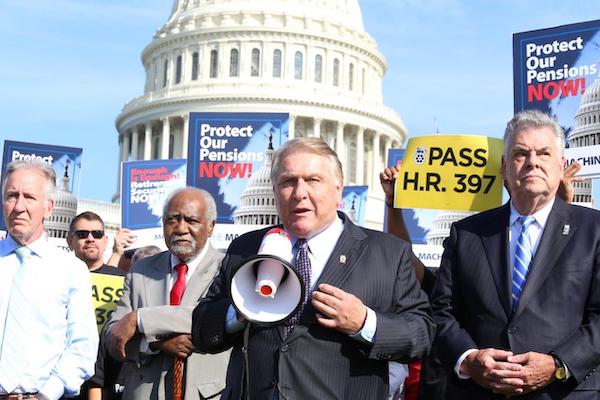News
Pension Push Moves Forward

Years of hard work and countless visits to the nation’s capital by working and retired Teamsters finally paid off this summer when the House voted to approve H.R. 397, legislation that will protect the solvency of multiemployer pensions and bring retirement security to some 1.5 million Americans whose nest eggs are currently threatened.
The measure is now before the Senate, where the Republican-led chamber will have to be convinced to take it up.
Scores of Teamster-affiliated pensioners were joined by other union members and retirees in the House chamber July 24 as the votes rolled in putting the Rehabilitation for Multiemployer Pensions Act, more commonly referred to as The Butch Lewis Act, over the top.
The House voted 264-169 in favor of the measure, with all of the Democrats plus 29 Republican lawmakers voting for the legislation.
‘Unchecked Recklessness’
Taking to the House floor toward the end of debate on the bill, House Speaker Nancy Pelosi (D-Calif.) said “Congress has a responsibility” to stand up for hardworking Americans who had paid into such plans with the understanding they would receive their pensions in retirement.
She specifically mentioned the plights of Rita Lewis, the widow of retired Local 100 President Butch Lewis for whom the legislation is named, as well as Kenny Stribling, a Local 200 retiree and co-Chair of the Milwaukee Committee to Protect Pensions, among those who stood as examples for why Capitol Hill needs to intervene to fix the problem.
“Unchecked recklessness on Wall Street ignited a financial meltdown that dealt a devastating blow to multiemployer pension plans, while dangerous deregulation and relentless attacks against unions have eaten away at these plans’ health,” Pelosi said. “If we do not act, the pensions of many workers and retirees will be cut to the bone, and the futures of their families and communities will be thrown into jeopardy.”
Protecting Pensions
Speaking to supporters of the bill before the vote, Teamsters General President Jim Hoffa said the union was standing up not only for its members and retirees, but others who could be punished through no fault of their own.
“You wonder how anyone could be against what we are for, helping people have a better life,” he said. “We are on the right side of the angels.”
The House victory could not have happened without the hard work of Reps. Richard Neal (D-Mass.) and Peter King (R-N.Y.), the lead co-sponsors on the bill. They fought together to push forward the legislation and garnered support of their colleagues in both parties. But the job doesn’t end there.
Sen. Sherrod Brown has introduced a Senate companion bill to the legislation, S. 2254. It is more essential than ever for members and retirees to get involved. Senators need to hear from everyone about the importance of this legislation if this effort is going to succeed.
High Stakes
There is a lot at stake, not only to those with pensions but to the public at large. In fact, as a report released by the National Institute on Retirement Security earlier this year explains, each pension benefit dollar paid out supported $2.13 in total economic input in 2016.
During that year, $41.8 billion in pension benefits were paid to 3.5 million retired Americans. Those expenditures collectively supported nearly 543,000 American jobs; $89 billion in total economic output; and $14.7 billion in federal, state and local tax revenue.
What will become of those jobs and tax dollars if these pension plans are allowed to die? Affected communities will see less business in their stores, which will reduce the need for workers and will also reduce tax revenue.
And this doesn’t even address the increased need for social services retirees who have their benefits slashed will experience, costing taxpayers even more.
A Long Fight
Teamsters and retirees have logged a lot of miles to get to this point.
For many, there have been repeated trips to Capitol Hill as well as too-many-to-count meetings across their home regions to discuss pensions. Some have even testified at hearings before Congress.
Since the beginning of 2018 alone, there was a massive rally in Columbus, Ohio that drew some 14,000 people followed by a town hall event in Detroit just a couple of weeks later that drew Pelosi and a bevy of lawmakers to an overflowing union hall.
Even with a mandate for action, however, a bipartisan joint congressional committee could not come up with a solution by the end of last year. That’s what makes the House’s passage of legislation in July so important. It is a real, tangible step that shows change is possible. But the Senate looms.
Teamsters who have been involved in the fight know it will not be easy. But they urged their fellow union brothers and sisters to reach out to their senators and get them to support the legislation.
“Especially some of the members who are against us, we have to remind them that we vote for our congressmen, we don’t buy them,” said Mike Walden, President of the National United Committee to Protect Pensions and Local 24 retiree.
“They have to know that we do get out and vote and we are constituents. We have thousands in some of these states, not only our union but other unions. This is a pension crisis and everyone needs to step up.”
“I urge all of our members out there to call, and to continue to call, and let your senators know how important this issue really is. Let’s get this solution through the Senate and to the president’s desk and get it signed!” Stribling said.